Nsg 6420 week 2 quiz 2 Study guides, Class notes & Summaries
Looking for the best study guides, study notes and summaries about Nsg 6420 week 2 quiz 2? On this page you'll find 440 study documents about Nsg 6420 week 2 quiz 2.
Page 4 out of 440 results
Sort by
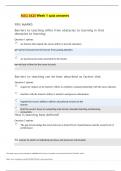
-
NSG 6420 Week 1 quiz answers
- Exam (elaborations) • 9 pages • 2024
-
- $8.99
- + learn more
NSG 6420 Week 1 quiz answers 95% MARKS Barriers to teaching differ from obstacles to learning in that obstacles to learning: Question 1 options: are barriers that impede the nurses ability to provide education are psychosocial issues presented by the learner Barriers to teaching can be best described as factors that Question 2 options: negatively impact on the learner's efforts to establish a mutual partnership with the nurse educator. interfere with the learner...
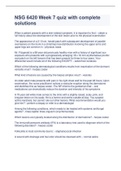
-
NSG 6420 Week 7 quiz with complete solutions | Latest 2023/2024
- Exam (elaborations) • 3 pages • 2023
- Available in package deal
-
- $9.49
- + learn more
NSG 6420 Week 7 quiz with complete solutions | Latest 2023/2024 When a patient presents with a skin-related complaint, it is important to first: - obtain a full history about the development of the skin lesion prior to the physical examination The appearance of a 2-10 cm. herald patch with subsequent development of parallel oval lesions on the trunk in a christmas tree distribution involving the upper arms and upper legs are common in - pityriasis rosea Mr. Fitzgerald is a 68-year-old prev...
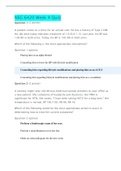
-
NSG 6420 Week 4 Quiz
- Exam (elaborations) • 6 pages • 2022
-
- $10.19
- 1x sold
- + learn more
NSG 6420 Week 4 Quiz Question 1 (2 points) A patient comes to a clinic for an annual visit. He has a history of Type 2 DM. His lab work today indicates creatinine of 1.6 (0.6–1.5). Last year, his BP was 138/80 in both arms. Today, his BP is 150/80 in both arms. Which of the following is the most appropriate intervention? Question 1 options: Placing him on an alpha blocker Counseling him to lower his BP with lifestyle modification Counseling him regarding lifestyle modifications an...
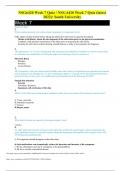
-
NSG6420 Week 7 Quiz / NSG 6420 Week 7 Quiz (latest 2022): South University
- Exam (elaborations) • 6 pages • 2024
-
- $10.98
- + learn more
NSG6420 Week 7 Quiz / NSG 6420 Week 7 Quiz (latest 2022): South University Week 7 Return to deck 1. When a patient presents with a skin-related complaint, it is important to first: Fully inspect all skin lesions before asking the patient how the lesion in question developed Obtain a full history about the development of the skin lesion prior to the physical examination Complete a full physical examination of the body prior to inspecting the skin lesion Examine the skin lesion without ...
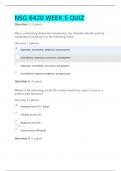
-
NSG 6420 WEEK 5 QUIZ
- Exam (elaborations) • 3 pages • 2024
-
- $9.99
- + learn more
NSG 6420 WEEK 5 QUIZ Question 1 (1 point) When performing abdominal assessment, the clinician should perform examination techniques in the following order: Question 1 options: Inspection, auscultation, palpation, and percussion Auscultation, inspection, percussion, and palpation Inspection, auscultation, percussion, and palpation Auscultation, inspection, palpation, and percussion Question 2 (1 point) Which of the following serum lab results would you expect to ...
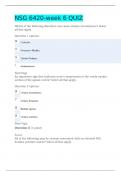
-
NSG 6420-week 6 QUIZ
- Exam (elaborations) • 3 pages • 2024
-
- $9.99
- + learn more
NSG 6420-week 6 QUIZ Which of the following disorders can cause urinary incontinence? Select all that apply Question 1 options: Cystocele Overactive Bladder Uterine Prolapse Endometriosis Next Page An important sign that indicates nerve compression at the cauda equina section of the spinal cord is? Select all that apply. Question 2 options: Urinary incontinence Urinary frequency Bladder spasms Urinary retention Next Page Question 3 (1 point) Saved All ...
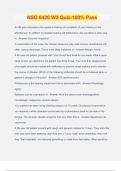
-
NSG 6420 W2 Quiz-100% Pass
- Exam (elaborations) • 3 pages • 2024
-
- $10.49
- + learn more
NSG 6420 W2 Quiz-100% Pass An 86-year-old patient who wears a hearing aid complains of poor hearing in the affected ear. In addition to possible hearing aid malfunction, this condition is often due to: -Answer-Cerumen impaction In examination of the nose, the clinician observes gray, pale mucous membranes with clear, serous discharge. This is most likely indicative of: -Answer-Allergic rhinitis A 45-year-old patient presents with "sore throat" and fever for one week. After a quick strep...
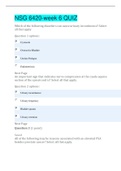
-
NSG 6420-week 6 QUIZ
- Exam (elaborations) • 3 pages • 2021
- Available in package deal
-
- $7.49
- 1x sold
- + learn more
NSG 6420-week 6 QUIZ Which of the following disorders can cause urinary incontinence? Select all that apply Question 1 options: Cystocele Overactive Bladder Uterine Prolapse Endometriosis Next Page An important sign that indicates nerve compression at the cauda equina section of the spinal cord is? Select all that apply. Question 2 options: Urinary incontinence Urinary frequency Bladder spasms Urinary retention Next Page Question 3 (1 point) Saved All of the following may be r...
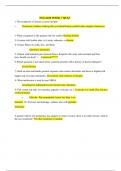
-
NSG 6420 WEEK 7 QUIZ
- Exam (elaborations) • 1 pages • 2024
-
- $8.49
- + learn more
NSG 6420 WEEK 7 QUIZ 1- The symptoms of chronic eczema include: • Thickened, leathery-looking skin or lichenification (called lichen simplex chronicus) 2- What occupation is the greatest risk for scabies-Nursing facility 3- Eczema with leather skin- is it acute, subacute, or chronic 4- Greasy flakes on scalp, face, and back seborrheic dermatitis 5- Patient with leukemia just released from a hospital with scaly rash on hands and feet, how should you treat? • Ivermectin***** 6- Whic...
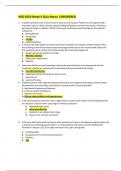
-
NSG 6420 Week 9 Quiz Neuro |ANSWERED
- Exam (elaborations) • 2 pages • 2024
-
- $8.99
- + learn more
NSG 6420 Week 9 Quiz Neuro |ANSWERED 1. A patient presents with a severe bout of dizziness and nausea. Patient has not experienced a traumatic injury or illness. Patient reports feeling off balance and feels the need to hold onto permanent things to stabilize. Which of the types of dizziness would categorize this patient’s symptoms? a. Disequilibrium b. Presyncope c. Vertigo d. Lightheadedness 2. A 45-year-old male patient presents with severe symptoms of vertigo combined with tinnitus...

Study stress? For sellers on Stuvia, these are actually golden times. KA-CHING! Earn from your study resources too and start uploading now. Discover all about earning on Stuvia


